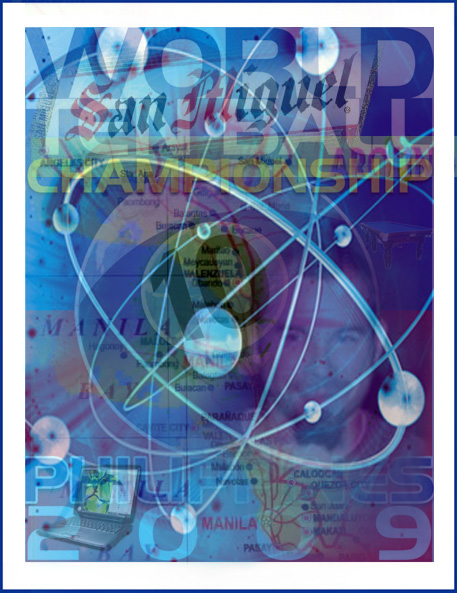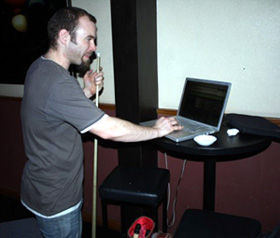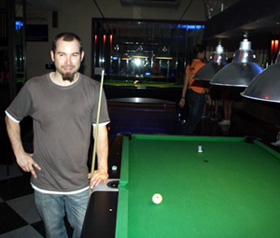World Trade Center
Philippine National Bank Complex
Manila Bay Area
Metro Manila
Philippines
www.tedlerner.com
25-30 November 2009

BANGING BALLS WHILE SEARCHING FOR THE SECRETS OF THE UNIVERSE
(Manila, Philippines)--When I walked into the One Side billiard hall in the Malate section of Manila on Tuesday night, I pretty much knew what to expect; a few hours of watching the best pool players in the world play money games in the finest “action” on earth. For sure what I most certainly didn’t expect was to come face to face with the most cutting edge science on the planet.
But as it turned out, both the best pool and science even Albert Einstein would envy were happening right in front of my eyes.
Now, you’re probably assuming that I’m about to tell you about some mysterious old time hustler from the dirty and overcrowded back streets of Manila imparting long held secrets and philosophies never heard before beyond the teeming barrios of this sultry pool loving archipelago. Well, I’ve had nights like that before in Manila, but they usually involved the great Efren Reyes. And while Efren is surely a genius on the green felt pitch, he wouldn’t know a science experiment if you made him shoot with a test tube filled with bubbling h2o.

"Read More..." for the details.
Normally I go upstairs at Oneside because that’s where all the players go. The World Ten Ball Championship was starting the next day and there was surely some mind boggling matchups of the best players in the world getting tuned up with plenty of money on the line. But as I came in off the choked streets of Malate, I noticed that Oneside had added two tables downstairs. Unlike the upstairs, which has bare fluorescent bulbs and choking cigarette smoke, the new downstairs had ambient mood lighting, good music on the stereo and looked to be relatively empty. So I decided to go check it out for one cold San Miguel beer.
That was when I ran into Jonni Fulcher, the 35 year old Scottish pool pro who was in town for the World 10 ball Championship. I knew Jonni from back in April when he came to Manila for the Philippine Open. He played a match on the TV table in that tournament which I did commentary for and we became friendly afterwards.
 When I saw Jonni he was typing something into his laptop, which had been set up in the corner, while his cue stick rested up against his side. We exchanged pleasantries and we talked about the tournament. As I sipped my San Mig, I could see he was “chatting” with someone on his laptop. After typing in a message and hitting the send button, he turned around to the pool table and started quickly potting balls. After hitting a few balls, he would run back to the laptop to see the response and send another message. Then he would turn around and start hitting balls again.
When I saw Jonni he was typing something into his laptop, which had been set up in the corner, while his cue stick rested up against his side. We exchanged pleasantries and we talked about the tournament. As I sipped my San Mig, I could see he was “chatting” with someone on his laptop. After typing in a message and hitting the send button, he turned around to the pool table and started quickly potting balls. After hitting a few balls, he would run back to the laptop to see the response and send another message. Then he would turn around and start hitting balls again. I didn’t really think anything of this as I figured he was probably chatting with his girlfriend or parents back in England. But then I stood up and walked over to the laptop and noticed that his screen was filled with a bunch of serious looking charts and graphs. Clearly this was no ordinary chat session.
It turns out that between full table cuts down the rail, and three cushion kicks, Jonni was exchanging important messages with his “colleagues” in Geneva, Switzerland where he currently lives. You see outside of the pool world, Jonni actually has a real job. He’s a nuclear physicist working for the Large Hadron Collider(LHC) project, the most advanced, and largest scientific experiment the world has ever known.
“It’s largest, most expensive machine ever built by man,” Jonni exclaimed. Indeed, the 27 kilometer (17 mi.) long particle accelerator is buried over 150 meters underground near the French-Swiss border. It cost something like $6 billion to build and involves thousands of scientists from around the world. I couldn’t fully follow the intricacies of how he explained it, but over the next hour or more, I heard Jonni tell me the project had something to do with scientists like himself smashing sub atomic particles together to try and discover things like the origins of the universe, how gravity works, how time and space work, how light travels. He mentioned Einstein’s E=MC2 and that this was all on the very limits of physics and science and could and will lead to discoveries and technologies of tomorrow.
And you thought a 10 ball rack with no balls down and three separate clusters took a lot of thought.
Anyway, Jonni was clearly excited and on edge and it had nothing to do with the impending tournament. The LHC had actually started up a year ago but had been down for the last year for repairs. Then just the day before I saw him at Oneside, the LHC had started back up and new and important data was already pouring in. The scientific community around the world was abuzz with excitement. And Jonni was in the thick of things right there in the bar, next to the Brunswick knockoff table.
“This thing(the LHC) is going off just as the tournament is starting,” he said laughing as he took a swig of beer, typed a message to his colleague in Geneva, then returned to run a rack of 10 ball.
Like many of his fellow pros from the UK, Fulcher started in another billiard discipline. He took up and fell in love with snooker when he was 9 years old. It was also during his younger school years that Fulcher’s teachers discovered that he was more than a little handy with math and science, and they began pushing him to pursue the field further.
After his primary and undergraduate years, he attended London’s Imperial College, which is one of the top physics schools in the world, and secured his PHD in physics. When he wasn’t studying and doing research on some of the most difficult scientific questions of the day, he played lots of snooker. Fulcher eventually rose to the top of the prestigious University snooker leagues in England. He never went pro, but says he has run a rare 155 in snooker and captured it on video to prove it. (you can see the 155 run here: http://www.youtube.com/watch?v=f6wFhO2ZXP0)
In 2003 Fulcher first started playing American pool. With his Phd in hand, he landed a job in Geneva working on the LHC project. With what little spare time he could find, he won everything there was to win in Swiss snooker before finally quitting the sport in 2004.
He then devoted his billiards time to American pool and would take time off work to enter Euro Tour events. The effort paid off when won his one and only Euro Tour tournament, the 2006 Swiss Open. After taking down Ralf Souquet in the round of 16, he went on to the finals where he beat Tony Drago. The win over Drago was particularly satisfying for Fulcher because he was down 8-7, then ran three racks in a row to win the title.
Fulcher says he rarely tells other pros about what he does outside of pool because they immediately lose interest.
“When I start telling other players what I do,” he says, “they get bored. They wouldn’t understand it anyway.”
 Some people who are interested assume that Fulcher’s high intelligence in physics can somehow translate to magic on the pool table. Fulcher, however, says the two disciplines require completely separate thought processes.
Some people who are interested assume that Fulcher’s high intelligence in physics can somehow translate to magic on the pool table. Fulcher, however, says the two disciplines require completely separate thought processes. “I do the opposite when I play pool,” he said. “I use my brain all day. When I play pool, I try not to think too much. If you over think in pool, you can screw up simple shots. The best way to play pool is intuitively.”
He says his colleagues frowned upon him coming to Manila for the World Ten Ball Championship this year because the collider project was just getting going after being down for a year.
“For the last year they didn’t mind if I went to a pool tournament,” he said, “because the collider was down and being repaired. But this week it’s going to be mental. “
So if you see a wide eyed guy with a goatee at this year’s World 10 ball running between matches to open his laptop, you can be pretty sure he’s not checking out the live scoring online. It’s Dr. Jonni Fulcher. Professional pool player and nuclear physicist literally on the cutting edge of the known universe.
Ted Lerner is a freelance journalist and sports television commentator based in the Philippines. He is a member of the United States Billiard Media Association and is currently the Philippines’ correspondent for Billiards Digest magazine. He will be the play by play commentor on this year’s World 10-ball Championship. Email Ted at ted@tedlerner.com. Or visit his website at www.tedlerner.com.